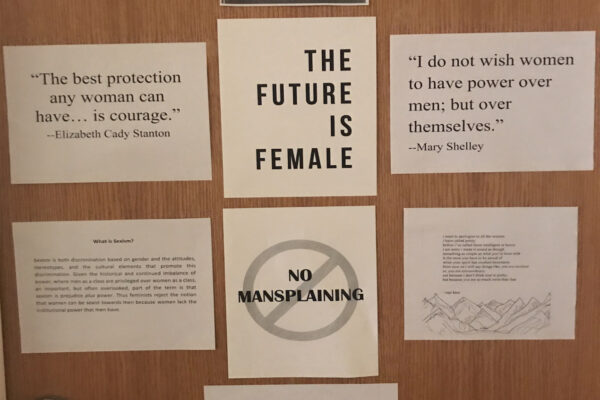“I worked extremely hard to get a law degree from a very well-respected school so that I could pursue my passion of litigating crimes involving women and children,” said Rossi. “Their request made me feel like my contributions weren’t noticed or didn’t matter.”
During the trial, Rossi provided advice on jury selection and litigation strategy, but the men ignored her. The only witness they allowed her to question was the victim’s wife because they thought it would look more “sympathetic” for a woman to talk to her.
“My role was circumscribed to being the pretty lady at the table and then the sweet, nurturing female attorney to elicit emotional testimony from a grieving widow,” said Rossi. “Everyone at the office knew and as a joke they started calling me ‘Ms. Third Judicial District Attorney.’ It was humiliating.”
Brulotte knows all too well what it’s like to be told she must embrace and obey sexist stereotypes in order to succeed at work. In June 2018, even as she suffered constant harassment from a male colleague who would call her lewd sexual names and insist she must wear skirts to win her cases, her direct supervisor formally disciplined her for not smiling enough, especially to her male colleagues, and accused her of contributing to “low office morale.”
“We had endemic sexism at the office, but somehow I was accused of causing low office morale,” said Brulotte. “I didn’t walk around smiling all of the time because I was dealing with gender discrimination and 400 domestic violence and sexual assault cases, many of which were extremely upsetting.”
Brulotte’s supervisor told her she had to “come outside of her comfort zone,” and start smiling and saying hi to each and every person she passed as she entered and left the office. Yet, management never expected the same from male staff or held them accountable for sexist actions.
Even after an incident where Byers became so irate with Duffin in a staff meeting that he slammed his notebook on the table, threw a pen in her direction, and stormed out of the room, he never faced any consequences. Instead, after Duffin raised concerns about his conduct in a Human Resources complaint, Byers retaliated by nearly doubling her caseload.
In the end, management not only signaled to female staff that their only value was in their appearance or how they made the men in the office feel, they also sent a clear signal to the women that if they spoke up they would be punished.
Taking a Stand
Less than a month after Brulotte and Duffin were suspended, the DA’s Office fired them. No longer able to work in such toxic conditions, Rossi resigned.
By July, three exceptional attorneys had been forced out of their jobs after years of dedicated service to their office and community, all on account of their gender and their refusal to be silenced on matters of personal and public concern.
“They felt confident enough to fire all of the female line attorneys at once without cause because they have been treating women this way for years, and have been getting away with it,” said Brulotte. “We’re not the first women this has happened to at that office.”
Their careers as prosecutors in Doña Ana County may be over, but their fight for justice isn’t.
The ACLU of New Mexico and cooperating attorney Rachel Higgins agreed to represent Brulotte, Duffin, and Rossi, and on April 29, we filed a lawsuit against the Third Judicial District Attorney’s Office for violating the Fair Pay for Women Act, the Whistleblower Protection Act, and the New Mexico Constitution’s Free Speech Clause.


